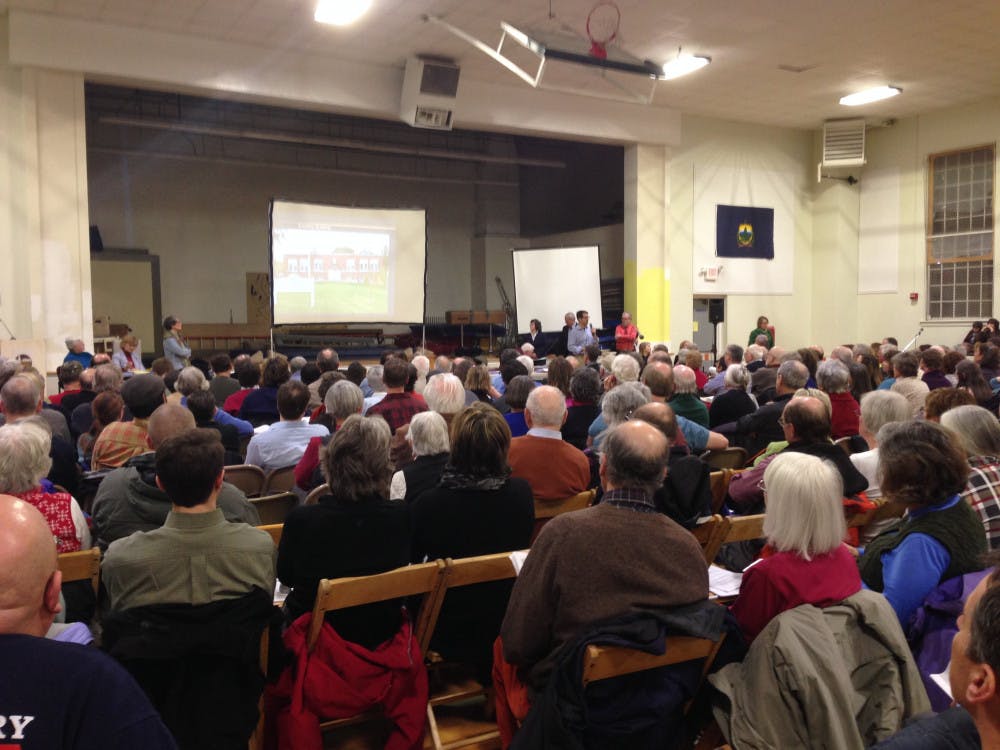A hotly debated proposal to relocate the Middlebury Town Hall passed in a vote taken this Tuesday, March 4th.
The decision comes after weeks of debate in the Middlebury community as to the relative merits and drawbacks of the proposal. Proposal 6, the controversial plan, represents an endeavor to move the Middlebury Town Hall and the town’s recreation facilities from their current location in between College and Main Street.
The plan calls for a relocation of the Town Offices to a new location a few hundred feet across the road from the current Town Hall Office to the Osborne House site at 77 Main Street, and a relocation of the current recreational facilities to a new location proximate to the Middlebury Union Middle and High schools on Creek Road.
As outlined in the plan, the current Town Office and Recreational Facility will be demolished and the parcel of land upon which it was built will become the property of the College.
In order to finance the project, the Town of Middlebury will take out a bond in the amount of $6.5 million. Of that $6.5 million, the College has pledged to pay $4.5 million of the up front costs and contribute a further million dollars for relocation and demolition costs of the current facilities.
Currently, the College plans to create a park in the space, but plans are preliminary and planning officials at the meeting told the audience that the community would remain involved as designs for the space are drawn up.
In the weeks prior to Monday’s Town Hall meeting, debate approached a fever pitch.
Due to the incredible volume of letters received by Middlebury’s newspaper, the Addison County Independent, editor and publisher Angelo Lynn had to issue a statement limiting readers to the submission of a single letter each in the time leading up to the Town Meeting.
Similarly, numerous residents have produced lawn signs, bumper stickers, and pins emblazoned with slogans like “Save the Gym!” and “Don’t Sell the Heart of Middlebury.”
At Monday’s meeting, the 280 voting Middlebury residents who checked into the meeting arrived at the discussion — which took place in the decaying Town Hall building itself — to discover an unusually politicized atmosphere.
At the door, an organization of opponents of the proposal called “Middlebury Residents for Preserving our Municipal Site” distributed flyers outlining “a dozen one-sentence reasons to vote NO on article 6.”
Jim Douglas, former Vt. governor and Executive in Residence at the College, moderated the event, which alternated between tones of rancor and conciliation throughout the night.
In the interest of broadening the discussion and hearing as many voices as possible, Douglas proposed a cap of two minutes for personal comments, a measure to which the townspeople agreed heartily.
What proceeded were a number of introductions to and expositions on the proposal. These presentations represented the sixth public informational session about the proposal, and supplemented the numerous tours of the aging facility that had been offered to Middlebury residents in recent weeks.
Opponents of the proposal objected to the length of the presentations, claiming that the presenters had exceeded their two-minute time limit.
One objector “request[ed] that the moderator be removed for not following his own rules.”
Douglas contravened by indicating that the two-minute time limit had been instituted for the comments portion of the proceedings and not for the presenters, a distinction affirmed by the townspeople.
Arguments against the proposal focused on the rushed time-frame, the myopic nature of the real-estate sale, and the exclusion of local citizens in the planning process.
“The proposal favors expediency over quality,” argued Middlebury resident Adam Franco at the Town Meeting.
Another Middlebury resident likened the rift between townspeople to “an infected wound,” and described proposal six as a short-term “band-aid” when the community really needed an “antiseptic” to solve the problem in the long term.
In the first half of the proceedings, all of the commentary was offered by Middlebury townspeople opposed the proposal. Addison County Independent editor and publisher, Angelo Lynn, described this vociferous group a few weeks ago as a “very vocal minority,” implying his opinion that a silent majority of Middlebury townspeople supported the proposal from the beginning.
At the end of the meeting, however, a number of citizens took the microphone to express their support for the proposal.
Arguments in favor of the proposal stressed that it represented a “pragmatic” approach rather than an “idealistic” approach. Middlebury residents questioned the integrity of the decaying Town Hall structure and stressed that changes must be made to the building before someone gets hurt.
Monday’s debate represented the most recent public-forum debate over the proposal to relocate the Town Hall structure, but by no means the only public discussion.
On Feb. 25, more than 400 citizens and stake-holders packed the auditorium of the Middlebury Union High School for an acrimonious debate at the School Board’s Annual Meeting and Budget Hearing.
At this budget hearing, the voters chose to authorize the lease of the land on Creek Road to the Town of Middlebury by a margin of 306-118. This action set the stage for Proposal 6 at the Middlebury Town Meeting by imbuing the town with the authority to use the land on Creek Road for the new proposed recreational facilities.
Now that the vote is complete, the town estimates that the construction will begin in Sept. 2014, with an expected date of completion to be set for Aug. 2015.
Controversial Town Hall Proposal Passes

Comments



